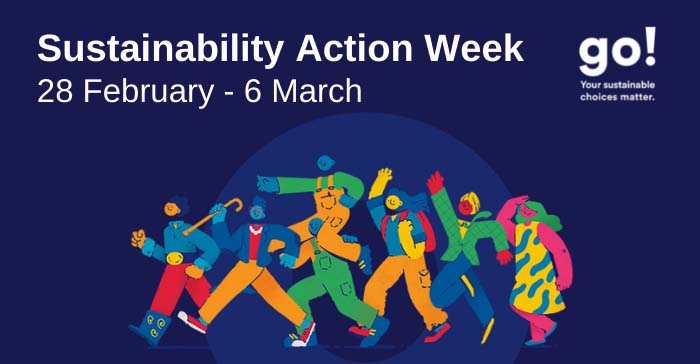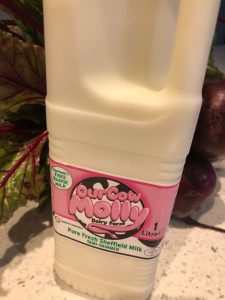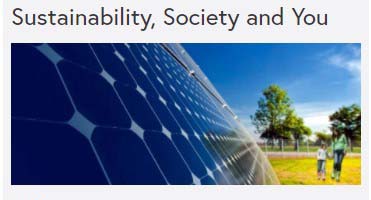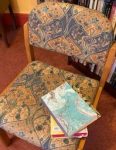
March 2, 2022, by Ryan Neal
The Sustainability Challenge – day three
In celebration of Sustainability Action Week, we’ve challenged two of our senior leaders – Andy Nolan, Director of Development and Sustainability; and Professor Sarah Speight, Pro-Vice-Chancellor for Education and Student Experience – to spend the week living as sustainably as possible. Each day they will be chronicling their experience and sharing some tips so make sure you check back regularly.
Andy
Working from home on a cold, wet day would’ve been an alien concept in 2019. Without doubt, I would have been on campus. The pandemic and the restrictions placed on us gave us a crash course in learning to work from home. In February 2020 I barely knew what Microsoft Teams was; by the end of March I was at home with its neat chat functions and video conference meetings. Now, to be honest, I find doing it five days a week tiring – so it’s good to have some balance. Now that I do work from home, I’m very conscious of how I can minimise my environmental impact during the day. I’ve set up a small office in the attic which means I don’t need to heat the whole house for a start.
Living in a 160+ year old Victorian house means a lot of effort has gone into making it more energy efficient over the three years we’ve lived in it. We have a very efficient boiler (although it’s gas – one day it’ll be a heat pump!) and a very well insulated hot water tank, and I have spent countless hours insulating the cellar and loft spaces to reduce the heat losses. It’s made a big difference – and it doesn’t have to be too expensive. LED lights – and a firm reminder to the teenagers in the house that lights don’t turn themselves off – can make a big difference.
 Shortly after we moved in, I installed a Nest thermostat to accurately control space and water heating. It’s made controlling the times of day the heating comes on a breeze and it also means, through the app, that I can turn it on and off (mainly off, I hasten to add!) when I am away from the house. So, if you’re delayed coming home from work it’s easy to postpone the heating coming on. All in all, it makes life a lot easier. Coupled with the smart meter I had installed, we can accurately monitor the consumption and cost of energy too – managing consumption is the way to lower bills and reducing carbon emissions.
Shortly after we moved in, I installed a Nest thermostat to accurately control space and water heating. It’s made controlling the times of day the heating comes on a breeze and it also means, through the app, that I can turn it on and off (mainly off, I hasten to add!) when I am away from the house. So, if you’re delayed coming home from work it’s easy to postpone the heating coming on. All in all, it makes life a lot easier. Coupled with the smart meter I had installed, we can accurately monitor the consumption and cost of energy too – managing consumption is the way to lower bills and reducing carbon emissions.
 I’ve grown up in a generation that went from meat being a once or twice a week event to it being commonplace in everyone’s daily routine. Despite inflation, meat products remain relatively cheap compared to what they were. Although I am not vegetarian, I have reduced my consumption of meat significantly over the past two or three years – both for health reasons and because I understand the environmental arguments. Throughout this week I have maintained a meat-free diet and reduced dairy where I can (dry Weetabix are a tough ask without some milk!). When I buy milk I like to buy local – we’re lucky to have both doorstep delivery options (delivered in glass bottles which can be washed and re-used) and a fantastic local dairy – Our Cow Molly – who deliver milk on the day the cows produce it. It’s available in glass bottles but today I had to buy it in plastic. Our Cow Molly makes the best ice cream too – do make sure you try some if you’re ever in Sheffield.
I’ve grown up in a generation that went from meat being a once or twice a week event to it being commonplace in everyone’s daily routine. Despite inflation, meat products remain relatively cheap compared to what they were. Although I am not vegetarian, I have reduced my consumption of meat significantly over the past two or three years – both for health reasons and because I understand the environmental arguments. Throughout this week I have maintained a meat-free diet and reduced dairy where I can (dry Weetabix are a tough ask without some milk!). When I buy milk I like to buy local – we’re lucky to have both doorstep delivery options (delivered in glass bottles which can be washed and re-used) and a fantastic local dairy – Our Cow Molly – who deliver milk on the day the cows produce it. It’s available in glass bottles but today I had to buy it in plastic. Our Cow Molly makes the best ice cream too – do make sure you try some if you’re ever in Sheffield.
 Tonight I’m roasting seasonal vegetables for dinner – beets, parsnips, sweet potatoes, carrots, onions and butternut squash with garlic and chilli. Lower carbon, healthy and tasty! I like to use the local greengrocers wherever I can and there’s a great one just two minutes’ walk from my house – Fruit-a-Peel. Shopping local keeps money in the local economy rather than paying out to supermarket shareholders too. I think we were all grateful for the local shops during lockdown and would do well to remember that now that restrictions are being lifted. There are some really interesting articles on diet on the Conversation UK.
Tonight I’m roasting seasonal vegetables for dinner – beets, parsnips, sweet potatoes, carrots, onions and butternut squash with garlic and chilli. Lower carbon, healthy and tasty! I like to use the local greengrocers wherever I can and there’s a great one just two minutes’ walk from my house – Fruit-a-Peel. Shopping local keeps money in the local economy rather than paying out to supermarket shareholders too. I think we were all grateful for the local shops during lockdown and would do well to remember that now that restrictions are being lifted. There are some really interesting articles on diet on the Conversation UK.
I’m really enjoying the challenge the team have set me this week. It’s raising my consciousness about some of the decisions I have made and keeping me sharp! I’m enjoying reading Sarah’s experiences too. If you have any questions or thoughts do drop me a line at andrew.nolan@nottingham.ac.uk.
Sarah
Sustainability and me
Today I’m working from home because my meetings are all online. Being at home prompts me to reflect on what motivates me to try to be more sustainable. Many of the small-scale domestic actions that I routinely take were adopted back in 2013 when I was involved in Nottingham’s first MOOC (Massive Open Online Course). It was called Sustainability, Society and You and we ran it on FutureLearn. The course was built and facilitated by a fantastic cross-disciplinary team of academics and PhD students. Looking back through my old (digital) files, I found a blog recording a discussion between me and members of the team. We were discussing what sparked our interest in sustainability. This is what we picked out:
1. Connection to the outdoors: days out with my family visiting woods, parks and ruined castles, leading to an interest in heritage.
2. Awareness of my father’s work in waste management – being brought up in a house where recycling was normal, and being shocked to visit houses where it was not.
3. My faith or religion – the idea of ‘stewardship’ and having respect for other living things.
4. Higher education experiences – finding sustainability connected to my degree course.
5. Professional life as an archaeologist or health professional – seeing sustainability in the process of work as well as in the content.
6. Adult Education – working with older people who were deeply involved in local projects to research or protect heritage.
7. Moving house and acquiring a large garden, leading to a passion for vegetable growing and an aspiration to become self-sufficient (guess who!).
8. Inspiring individuals active in environmental conservation.
9. Being passionate about a particular aspect of sustainability – eg energy.
10. Being aware of how much we waste and worrying about it.
11. Growing up in a decade of energy shortage (eg 1970s) and remembering the times of blackout when we had power cuts.
12. Wanting to leave a positive legacy for my children and grandchildren.
13. Recognising that there are good careers in sustainability.
14. The ability to use sustainable models (eg in healthcare) to serve multiple purposes – eg using therapeutic horticulture to engage disadvantaged people, supporting them to live healthily and to join communities.
15. Understanding that sustainability is a means to our wellbeing.
 We did all sorts of interesting activities with our learners during the course. We measured our water footprints using an online tool and we carried out waste audits – documenting the household waste we produced over the course of a week and assessing where it should go (eg landfill, compost, recycling, upcycling, reuse). The learners shared their tips with us, and I’ve been using several of these ever since. Here are three energy-related ones that I’m a bit obsessive about:
We did all sorts of interesting activities with our learners during the course. We measured our water footprints using an online tool and we carried out waste audits – documenting the household waste we produced over the course of a week and assessing where it should go (eg landfill, compost, recycling, upcycling, reuse). The learners shared their tips with us, and I’ve been using several of these ever since. Here are three energy-related ones that I’m a bit obsessive about:
1. In cold weather, close the curtains before the sun goes down to trap the heat left in the house and prevent it escaping.
2. When you use the cooker, leave the door open after switching it off and let the heat continue to warm your kitchen.
3. Avoid opening appliances unnecessarily (heat escapes from ovens, cold air escapes from fridges)
I am very conscious that my house is full of character but way down the league table when it comes to sustainability. It was built in the 1920s and isn’t energy efficient. It has solid brick walls, and the bedrooms are directly under the eaves of the house – hence there isn’t any insulation. It makes me very energy conscious and so I turn lights off, don’t overfill the kettle, use the washing machine at lower temperatures, etc. My extra effort this week is to time my showers – four minutes or less!
 The Sustainability, Society and You MOOC was years ago now, but the experience has had a lasting impact on me. So I’ll end today’s blog with a special hello to those colleagues who played the biggest part in it – Helen Whitehead, Steve Stapleton, Mike Clifford, Neil Sinclair, Cecilia Goria, Sally Hibbert, Simon Gosling, Eleanor Hadley Kershaw, Subarna Sivapalan, Simon Barnett, Alec Millward and Julian Tenney. And have a look at my favourite chair – it was extracted from a skip on University Park and reupholstered for me by Mike using an old curtain. Thanks Mike!
The Sustainability, Society and You MOOC was years ago now, but the experience has had a lasting impact on me. So I’ll end today’s blog with a special hello to those colleagues who played the biggest part in it – Helen Whitehead, Steve Stapleton, Mike Clifford, Neil Sinclair, Cecilia Goria, Sally Hibbert, Simon Gosling, Eleanor Hadley Kershaw, Subarna Sivapalan, Simon Barnett, Alec Millward and Julian Tenney. And have a look at my favourite chair – it was extracted from a skip on University Park and reupholstered for me by Mike using an old curtain. Thanks Mike!
Find out how Andy and Sarah got on on day one, day two, day four and day five.

Ah – I was wondering if the chair was still being used!